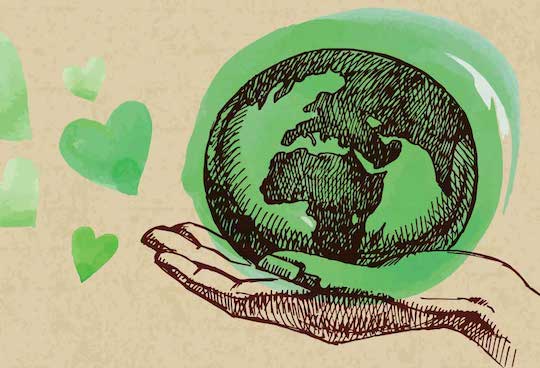There is plenty of information alerting against the ongoing devastating human war on Mother Nature. And the message is clear, writes Baher Kamal for IPS News.
The gloomy picture is drawn from indisputable scientific conclusions and should be already known by everybody, in particular by decision-makers, whether they are politicians… or rather not.
Oceans filling with plastic and turning more acidic. Extreme heat, wildfires and floods, as well as a record-breaking Atlantic hurricane season, have affected millions of people. Even these days, we are still facing COVID-19, a worldwide health pandemic linked to the health of our ecosystem.
Climate change, man-made changes to nature as well as crimes that disrupt biodiversity, such as deforestation, land-use change, intensified agriculture and livestock production or the growing illegal wildlife trade, can accelerate the speed of destruction of the planet.
The message is clear. And it is now once more launched on the occasion of the International Mother Earth Day, marked 22 April 2022, coinciding with the UN Decade on Ecosystem Restoration.
“Ecosystems support all life on Earth. The healthier our ecosystems are, the healthier the planet – and its people. Restoring our damaged ecosystems will help to end poverty, combat climate change and prevent mass extinction…”
“Humanity is waging war on nature. This is senseless and suicidal. The consequences of our recklessness are already apparent in human suffering, towering economic losses and the accelerating erosion of life on Earth,”
- António Guterres, United Nations Secretary-General
Making peace with nature
The UN Environment Programme (UNEP) report “Making Peace with Nature: A scientific blueprint to tackle the climate, biodiversity and pollution emergencies” translates the current state of scientific knowledge into crisp, clear and digestible facts-based messages that the world can relate to and follow up on.
“Humanity is waging war on nature. This is senseless and suicidal. The consequences of our recklessness are already apparent in human suffering, towering economic losses and the accelerating erosion of life on Earth,” said António Guterres, the United Nations Secretary General, in his forward to the report.
Many staggering facts have been repeated on the occasion of Mother Earth Day. Here are just some of them:
- None of the agreed global goals for the protection of life on Earth and for halting the degradation of land and oceans have been fully met.
- Three quarters of the land and two thirds of the oceans are now impacted by humans. One million of the world’s estimated 8 million species of plants and animals are threatened with extinction, and many of the ecosystem services essential for human well- being are eroding.
- It is estimated that around one million animal and plant species are now threatened with extinction.
- The planet is losing 4.7 million hectares of forests every year – an area larger than Denmark.
- A healthy ecosystem helps to protect humans from these diseases. Biological diversity makes it difficult for pathogens to spread rapidly.
- Environmental changes are impeding progress towards ending poverty and hunger, reducing inequalities and promoting sustainable economic growth, work for all and peaceful and inclusive societies.
- The well-being of today’s youth and future generations depends on an urgent and clear break with current trends of environmental decline.
- The coming decade is crucial. Society needs to reduce carbon dioxide emissions by 45 per cent by 2030 compared to 2010 levels and reach net-zero emissions by 2050 to achieve the 1.5°C Paris Agreement target, while at the same time conserving and restoring biodiversity and minimising pollution and waste.
- Over the last 50 years, the global economy has grown nearly fivefold, due largely to a tripling in extraction of natural resources and energy that has fuelled growth in production and consumption.
- The world population has increased by a factor of two, to 7.8 billion people, and though on average prosperity has also doubled, about 1.3 billion people remain poor and some 700 million are hungry.
- The increasingly unequal and resource-intensive model of development drives environmental decline through climate change, biodiversity loss and other forms of pollution and resource degradation.
Over-production, over-consumption
Two more scientific worrying findings are the fact that every year, 570 million tons of food is wasted at the household level, according to the United Nations Environment Programme’s (UNEP) Food Waste Index Report 2021.
And that meanwhile over 800 million people are still hungry, and global food waste accounts for 8–10 percent of greenhouse gas emissions. Food waste accelerates the triple planetary crisis of climate change, nature and biodiversity loss, and pollution and waste.
There is plenty of information alerting against the ongoing devastating human war on Mother Nature.
Should you need to know more about what exactly is climate change and what does the Paris Agreement say? Also about what actions are being taken and who is carrying them out? What are the latest scientific reports on the subject? Are we in time to save Mother Earth? Discover it here.
In its worth reading report Climate Change 2022: Mitigation of Climate Change, released on 4 April 2022, the Working Group III to the Sixth Assessment Report of the Intergovernmental Panel on Climate Change (IPCC), world scientists warn that “without immediate and deep emissions reductions across all sectors, limiting global warming to 1.5°C is beyond reach.”
Original source: Inter Press Service
Image credit: Doug Oster / Eastendfood.coop

